Did you know that the West African CFA franc, the official currency in this region, is pegged to the euro at a fixed rate? This means €1 equals fr.CFA 655.957, providing stability for travelers. Understanding the local currency is essential for a smooth trip, especially in a country where cash remains king.
Whether you’re exploring bustling markets or dining in a major city, knowing how to manage your money is key. The government supports the use of the CFA franc, but modern payment methods like prepaid travel cards are gaining popularity. These cards offer lower fees and better security, making them a smart choice for visitors.
From exchange rates to tipping etiquette, this guide will help you navigate the financial landscape with ease. Ready to make the most of your journey? Let’s dive into the essentials of currencies and payments in this vibrant West African destination.
Getting Started with Your Trip: Why Currency Matters
Exchange rates can make or break your travel budget, so staying informed is key. When visiting a new destination, understanding how currency works ensures you get the most out of your money. In this region, the West African CFA franc is pegged to the euro, providing stability but also requiring awareness of global economic trends.
Understanding Exchange Rates and Their Impact
Fluctuating exchange rates directly affect your spending power. For example, a stronger dollar might mean more CFA francs for your budget, while a weaker dollar could limit your options. Tools like real-time currency converters help you track these changes and plan accordingly.
The euro peg ensures stability, but it also means the CFA franc’s value is tied to Europe’s economic health. This connection can influence prices for goods and services, making it essential to monitor exchange rates before and during your trip.
Essential Payment Methods for Your Journey
Cash remains widely used in this region, but modern payment methods are gaining traction. Credit cards and prepaid travel cards offer convenience and security, especially in urban areas. These options often come with lower fees and better exchange rates compared to traditional cash exchanges.
Prepaid travel cards are particularly useful for managing your budget. They allow you to lock in exchange rates and avoid unexpected fees. Whether you’re shopping at local markets or dining at restaurants, having the right payment method ensures a smooth experience.
By understanding currency dynamics and choosing the best payment options, you can focus on enjoying your trip without financial stress.
Burkina Faso: Ultimate Travelers Guide to Currencies & Payments
Understanding the local currency is your first step to a hassle-free journey. In this country, the CFA franc is the official currency, and it’s essential for most transactions. While some international cards are accepted, cash remains the dominant method of payment, especially in local markets and smaller towns.
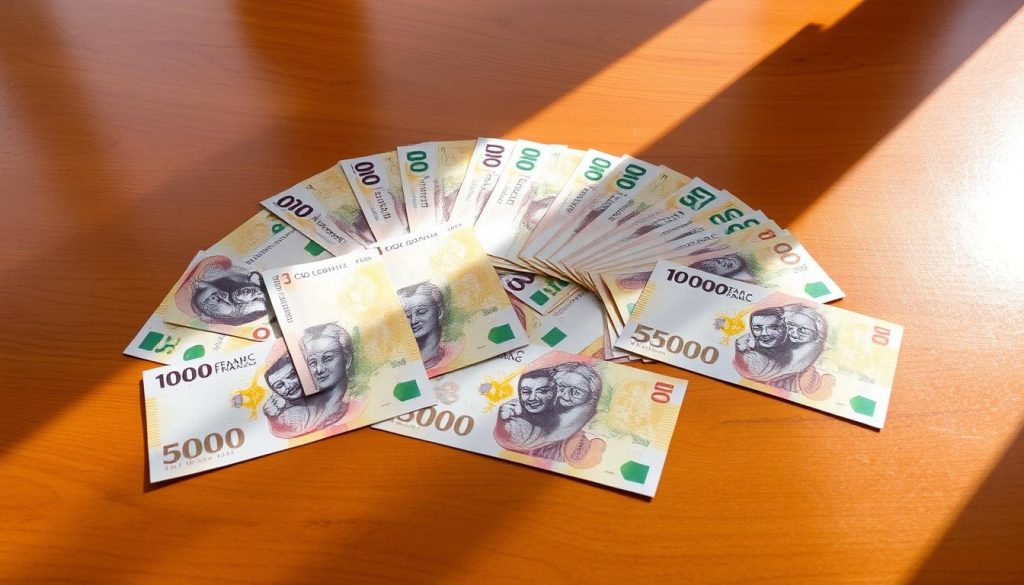
Verifying currency conversion rates before spending can save you money. The CFA franc is pegged to the euro, which provides stability but also means its value is influenced by global economic trends. Tools like real-time currency converters can help you stay updated and make informed decisions.
Preparing the right mix of payment methods is key. While cash is king in many situations, having a prepaid travel card or credit card can be useful in major cities. This ensures you’re ready for any transaction, whether you’re shopping at a bustling market or dining at a restaurant.
“Being prepared with the right currency and payment methods can make your trip smoother and more enjoyable.”
By understanding the role of the CFA franc and choosing the best payment options, you can focus on exploring this vibrant destination without financial stress. Whether you’re a first-time traveller or a seasoned explorer, these insights will help you navigate the financial landscape with ease.
Currency and Cash Transactions in Burkina Faso
The West African CFA franc plays a central role in daily transactions across the region. This currency, used in multiple countries, is pegged to the euro, ensuring stability for travelers and locals alike. Understanding its history and how it functions can make your trip smoother and more enjoyable.
The West African CFA Franc Explained
Introduced in 1945, the West African CFA franc was created to stabilize economies in the region. It is pegged to the euro at a fixed rate of €1 = fr.CFA 655.957. This peg provides predictability in exchange rates, making it easier for travelers to budget.
The currency is issued by the Central Bank of West African States (BCEAO). Its value is tied to the euro, meaning global economic trends can influence local pricing. For example, a stronger euro might make goods slightly more expensive for those using dollars.
Handling Cash Safely on the Road
Cash is the preferred method for most transactions, especially in local markets and smaller towns. To avoid loss or theft, follow these tips:
- Carry only the cash you need for the day.
- Use a money belt or hidden pouch for larger amounts.
- Avoid displaying cash in public areas.
When exchanging money, stick to reliable bureaus or banks. Major cities like Ouagadougou and Bobo-Dioulasso have trusted locations. Always count your money before leaving the counter.
| Location | Exchange Rate (USD to CFA) | Service Fee |
|---|---|---|
| Ouagadougou Airport | 1 USD = 575 CFA | 5% |
| Bobo-Dioulasso Market | 1 USD = 570 CFA | 3% |
| Local Bank | 1 USD = 580 CFA | 2% |
By understanding the CFA franc and managing cash wisely, you can focus on exploring this vibrant destination without financial stress. Whether you’re shopping at a bustling market or dining in a major city, these insights will help you navigate the financial landscape with ease.
Digital Payment Solutions and Prepaid Travel Cards
Traveling to a new country often means adapting to its financial systems, and digital payment solutions can make this transition smoother. In this region, cash remains widely used, but modern options like prepaid travel cards and credit cards are gaining popularity. These tools offer convenience, security, and cost savings for travelers.

Benefits of Using Prepaid Travel Cards
Prepaid travel cards are a smart choice for managing your budget abroad. They allow you to lock in exchange rates, avoiding unexpected fees. Many cards, like those from Revolut and Wise, support multiple currencies, making them ideal for international trips.
These cards also reduce the need to carry large amounts of cash, enhancing safety. With features like real-time balance tracking, you can monitor your spending effortlessly. Additionally, they often come with lower fees compared to traditional banks.
Using Credit and Debit Cards Abroad
Credit and debit cards are widely accepted in major cities, but it’s essential to choose the right provider. Look for cards with no foreign transaction fees and competitive exchange rates. This can save you money on every purchase.
Always notify your bank before traveling to avoid card blocks. Some providers also offer travel insurance and emergency assistance, adding an extra layer of security for your journey.
| Provider | Key Features | Exchange Rate |
|---|---|---|
| Revolut | Multi-currency support, low fees | Mid-market rate |
| Wise | Transparent fees, multi-currency account | Mid-market rate |
| Local Bank | Wide acceptance, higher fees | Bank rate |
By combining digital payment solutions with traditional cash, you can enjoy a seamless travel experience. Whether you’re exploring bustling markets or dining in a major city, these tools ensure you’re prepared for any transaction.
Exchanging Money: Where and How to Get CFA Francs
When visiting a new destination, knowing where and how to exchange money can save you time and stress. In this country, the CFA franc is the official currency, and finding reliable exchange locations is essential for a smooth trip. Whether you’re in a bustling city or a quieter area, planning ahead ensures you get the best rates and avoid scams.
Reliable Exchange Locations in Key Cities
Major cities like Ouagadougou offer trusted options for exchanging money. Banks such as Banque Internationale du Burkina are known for their reliability and competitive rates. Government-regulated bureaus are also a safe choice, as they adhere to strict standards.
To identify trustworthy locations, look for official signage and verify their credentials. Always compare rates and fees before making a transaction. This simple step can save you money and ensure you get the most value for your currency.
“Planning ahead and choosing the right exchange location can make your trip smoother and more enjoyable.”
Here’s a quick comparison of exchange rates in key locations:
| Location | Exchange Rate (USD to CFA) | Service Fee |
|---|---|---|
| Ouagadougou Airport | 1 USD = 575 CFA | 5% |
| Bobo-Dioulasso Market | 1 USD = 570 CFA | 3% |
| Local Bank | 1 USD = 580 CFA | 2% |
By following these tips, you can navigate the exchange process with confidence. Whether you’re a first-time traveller or a seasoned explorer, these insights will help you make the most of your money in this vibrant destination.
Navigating International Money Transfers and Fees
Sending money internationally can be tricky, especially when hidden fees eat into your budget. Whether you’re a traveler or sending funds to family, understanding the costs involved is essential. This guide will help you navigate the process and save both money and time.
Understanding Hidden Charges
Many banks and transfer providers add extra fees that can significantly reduce the amount received. These charges might include service fees, intermediary bank costs, or unfavorable exchange rates. For example, some banks charge a percentage of the transferred amount, while others have flat fees.
To avoid surprises, always ask for a breakdown of fees before completing a transfer. Comparing providers can help you find the most cost-effective option.
Benefits of Competitive Transfer Providers
Competitive providers often offer better exchange rates and lower fees than traditional banks. Services like Wise and Revolut are popular choices for their transparency and affordability. These platforms allow you to lock in exchange rates, ensuring you get the most value for your money.
Using these services can also save you time, as transfers are often processed faster than through banks.
Using Tools to Compare Fees
Online tools like Monito make it easy to compare fees and real-time exchange rates. Simply enter the amount you want to send, and the tool will show you the best options available. This can help you avoid unnecessary charges and ensure your money reaches its destination quickly.
“Comparing transfer providers can save you both money and time, making the process smoother and more efficient.”
Practical Tips for Avoiding Extra Fees
- Choose providers with transparent fee structures.
- Lock in exchange rates to avoid fluctuations.
- Use online tools to compare rates and fees before transferring.
- Notify your bank if you’re sending large amounts to avoid delays.
By following these tips, you can make international money transfers more affordable and efficient. Whether you’re sending funds to a loved one or managing expenses abroad, these insights will help you navigate the process with confidence.
Real-Time Currency Conversion and Tools
Keeping an eye on real-time exchange rates can make your travels more cost-effective and stress-free. Whether you’re exploring a bustling city or shopping in local markets, staying updated on currency fluctuations ensures you get the most out of your budget. Tools like Monito’s currency page provide live updates and smart alerts, helping you track the USD to XOF rate effortlessly.
Why Tracking Live Exchange Rates Matters
Exchange rates can change quickly, impacting how much you spend. For example, a favorable rate might mean more CFA francs for your dollar, while an unfavorable one could limit your options. Real-time tools ensure you’re always informed, allowing you to make smart financial decisions during your trip.
Services like Monito offer live feeds and alerts, so you never miss a good opportunity to exchange money. These tools are especially useful in a country where cash is king, helping you avoid unnecessary fees and get the best value for your currency.
How Digital Tools Simplify Currency Conversion
Digital tools and apps are game-changers for travelers. They eliminate the need for constant monitoring and manual calculations. Instead, you can focus on enjoying your journey while the tools handle the details. Features like smart alerts notify you when the rate is favorable, ensuring you spend wisely.
“Real-time currency conversion tools empower travelers to make informed decisions, saving both time and money.”
Here’s how these tools can enhance your travel experience:
- Track live exchange rates for USD to XOF.
- Receive alerts when rates are favorable.
- Simplify budgeting with real-time updates.
- Reduce the risk of overspending due to rate fluctuations.
By leveraging these tools, you can focus on exploring and enjoying your trip without worrying about financial surprises. Whether you’re a first-time tourist or a seasoned traveller, real-time currency conversion tools are a must-have for your journey.
Traveler Tips for Using ATMs and Banks
Navigating ATMs and banking services in a new country can be challenging, but with the right tips, you can ensure a smooth experience. In Burkina Faso, cash is widely used, making ATMs and banks essential for accessing local currency. Here’s how to use these services safely and efficiently.
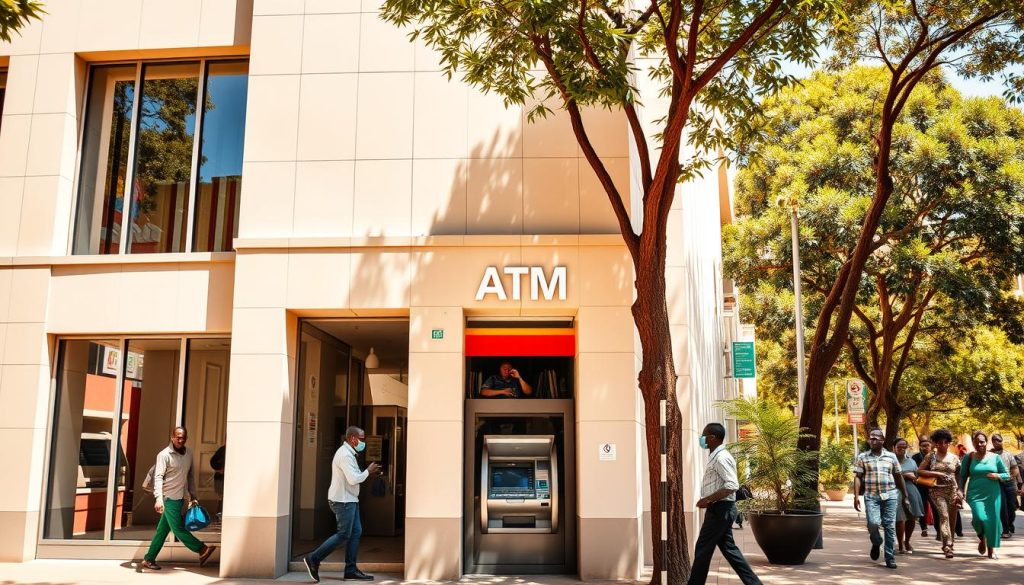
Finding Secure ATMs and Reliable Banking Services
In major cities like Ouagadougou, ATMs and bank branches are concentrated in busy areas. Stick to machines located inside banks or well-lit, secure locations. Avoid standalone ATMs in remote areas, as they may be less reliable or unsafe.
When choosing a bank, look for international brands or government-regulated institutions. These often offer better services for travelers, including lower fees and English-speaking staff. Always check for hidden charges before withdrawing money.
Essential Safety Tips for Using ATMs
Using ATMs abroad requires extra caution. Here are some tips to keep your money and personal information safe:
- Cover the keypad when entering your PIN to prevent skimming.
- Check the ATM for suspicious devices or tampering.
- Withdraw only what you need for the day to minimize risk.
- Notify your bank of your travel plans to avoid card blocks.
Common Pitfalls and How to Avoid Them
Hidden fees and unreliable machines are common issues. Always review the ATM’s fee disclosure before proceeding. If the machine looks outdated or unmaintained, find another one. Banks in major cities are generally more reliable than those in rural areas.
| Location | ATM Type | Average Fee |
|---|---|---|
| Ouagadougou | Bank ATMs | 2% |
| Bobo-Dioulasso | Standalone ATMs | 5% |
| Local Banks | Government ATMs | 1% |
By following these tips, you can navigate ATMs and banking services with confidence. Whether you’re in a major city or a smaller town, these insights will help you manage your money securely and efficiently.
Balancing Safety and Convenience in Payments
Balancing safety and convenience in payments is crucial for a stress-free travel experience. Whether you’re exploring a bustling city or shopping in local markets, knowing how to manage your money securely ensures peace of mind. This section provides actionable tips to help you navigate payments with confidence.
Best Practices for Secure Transactions
When traveling, safeguarding your transactions is essential. Financial experts recommend using a mix of digital and cash options to cover all situations. For example, prepaid travel cards offer security and convenience, while cash remains reliable in remote areas.
Here are some best practices to follow:
- Use AI-powered fraud management tools to detect risky behavior in real time.
- Notify your bank of your travel plans to avoid card blocks.
- Carry only the cash you need for the day to minimize risk.
- Verify the security of ATMs and payment terminals before use.
“A combination of digital and cash payments ensures you’re prepared for any situation, whether you’re in a major city or a remote village.”
Planning for Emergencies
Unexpected payment issues can arise during your trip. To stay prepared, keep a backup card and some emergency cash in a secure location. Additionally, research local banking services and exchange rates before your journey.
If you encounter a problem, contact your bank or payment provider immediately. Many services offer 24/7 support to assist travelers with payment issues.
By following these tips, you can enjoy a seamless travel experience while keeping your money safe. Whether you’re a first-time traveler or a seasoned explorer, these insights will help you navigate payments with ease.
Embracing Mobile Payment Technologies
Mobile payment technologies are reshaping how we handle transactions, especially for travelers exploring new destinations. In Burkina Faso, mobile wallets like Apple Pay, Google Pay, and Alipay are gaining traction, offering a convenient and secure way to manage your money on the go. While cash remains widely used, these digital solutions are transforming the way transactions are made.
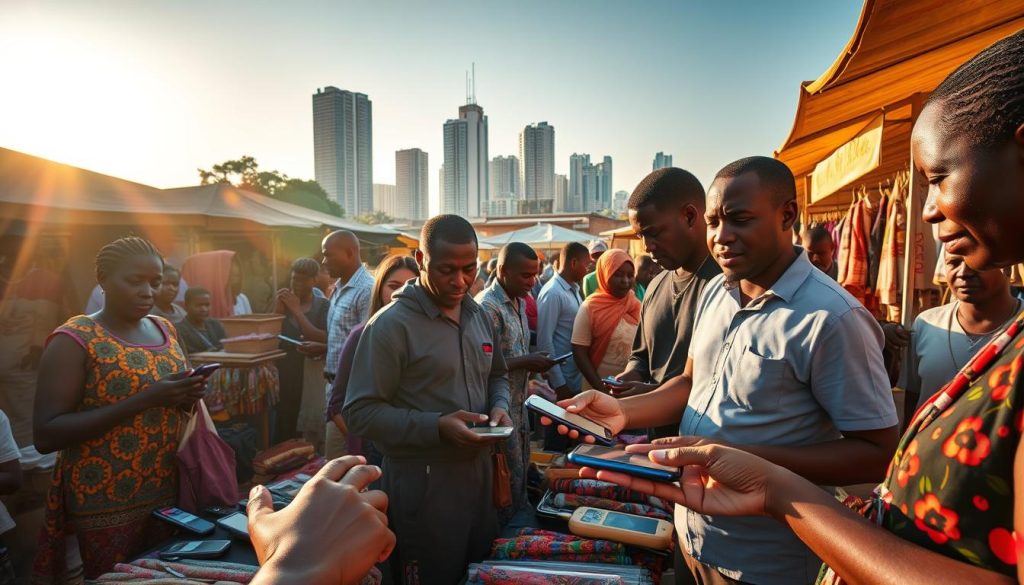
Exploring Mobile Wallet Options
Mobile wallets provide several benefits for travelers. They offer increased security through advanced encryption and biometric authentication. This reduces the risk of fraud and ensures your money is safe. Additionally, mobile payments are fast and easy to use, making them ideal for busy travelers.
Before your trip, it’s essential to verify the acceptance of these services in Burkina Faso. While major cities may support mobile wallets, rural areas might still rely on cash. For example, Apple Pay and Google Pay are widely accepted in urban centers, but availability in smaller towns may vary.
“Mobile wallets combine convenience and security, making them a smart choice for modern travelers.”
Practical Tips for Using Mobile Payments
To make the most of mobile payment technologies, follow these tips:
- Set up your mobile wallet before traveling and ensure it’s linked to your preferred card.
- Check for updates on supported countries and regions for your chosen service.
- Carry a backup payment method, such as cash or a prepaid travel card, for areas where mobile payments aren’t accepted.
Comparing Mobile Payment Technologies
Here’s a quick comparison of popular mobile wallet options:
| Service | Key Features | Availability in Burkina Faso |
|---|---|---|
| Apple Pay | Biometric authentication, wide acceptance | Limited to major cities |
| Google Pay | Multi-device support, easy setup | Available in urban areas |
| Alipay | Popular in Asia, growing global presence | Not widely available |
By embracing mobile payment technologies, you can enjoy a seamless and secure travel experience. Whether you’re in a bustling city or a remote village, these tools ensure you’re prepared for any transaction.
Health, Safety and Security Considerations When Traveling in Burkina Faso
Your safety and well-being are top priorities when exploring a new destination, and being prepared is key. In Burkina Faso, understanding local risks and having a plan for emergencies can make your trip smoother and more enjoyable. This section provides essential tips to help you stay safe and healthy during your visit.
Staying Alert to Local Risks and Security Tips
When traveling in Burkina Faso, it’s important to stay vigilant. The country faces challenges like terrorism, banditry, and civil unrest, particularly in certain regions. Avoid risky areas, especially near borders, and stay updated on local news.
In cities like Ouagadougou, petty crimes like pickpocketing are common. Keep your valuables secure and avoid displaying expensive items. Stick to well-lit, busy areas, especially at night.
Here are some additional safety tips:
- Carry a copy of your passport and visa at all times.
- Avoid traveling at night, especially on highways.
- Be cautious in crowded places like markets and public transport.
Emergency Preparedness and Helpful Contacts
Preparing for emergencies is crucial. Ensure you have access to reliable emergency contacts, including your country’s embassy or consulate. Save these numbers in your phone and keep a written copy in case of power loss.
Health risks like malaria and yellow fever are prevalent. Visit a doctor before your trip to get necessary vaccinations and medications. Carry a basic first-aid kit and any prescription medications you may need.
“Being prepared with the right information and resources can make all the difference in ensuring a safe and enjoyable trip.”
Here’s a quick reference for emergency contacts:
| Service | Contact |
|---|---|
| U.S. Embassy | +226 25 49 53 00 |
| Local Police | 17 |
| Medical Emergency | 112 |
By staying informed and prepared, you can focus on enjoying your journey while minimizing risks. Whether you’re exploring bustling cities or remote regions, these tips will help you navigate Burkina Faso with confidence.
Conclusion
Exploring a new destination requires smart financial planning to ensure a smooth experience. Managing your money wisely is essential, whether you’re using cash or digital payment solutions. By understanding local currency dynamics and choosing secure methods, you can avoid unnecessary stress during your travel.
Digital payments, like prepaid cards, offer convenience and safety, especially in urban areas. Always have a mix of payment options to cover all situations. Following safety protocols, such as carrying minimal cash and using trusted ATMs, ensures your funds remain secure.
With these tips, you’re ready to explore Burkina Faso confidently. Being prepared allows you to focus on enjoying the vibrant culture and unique experiences this country has to offer. Safe travels!
The above is subject to change.
Check back often to TRAVEL.COM for the latest travel tips and deals.
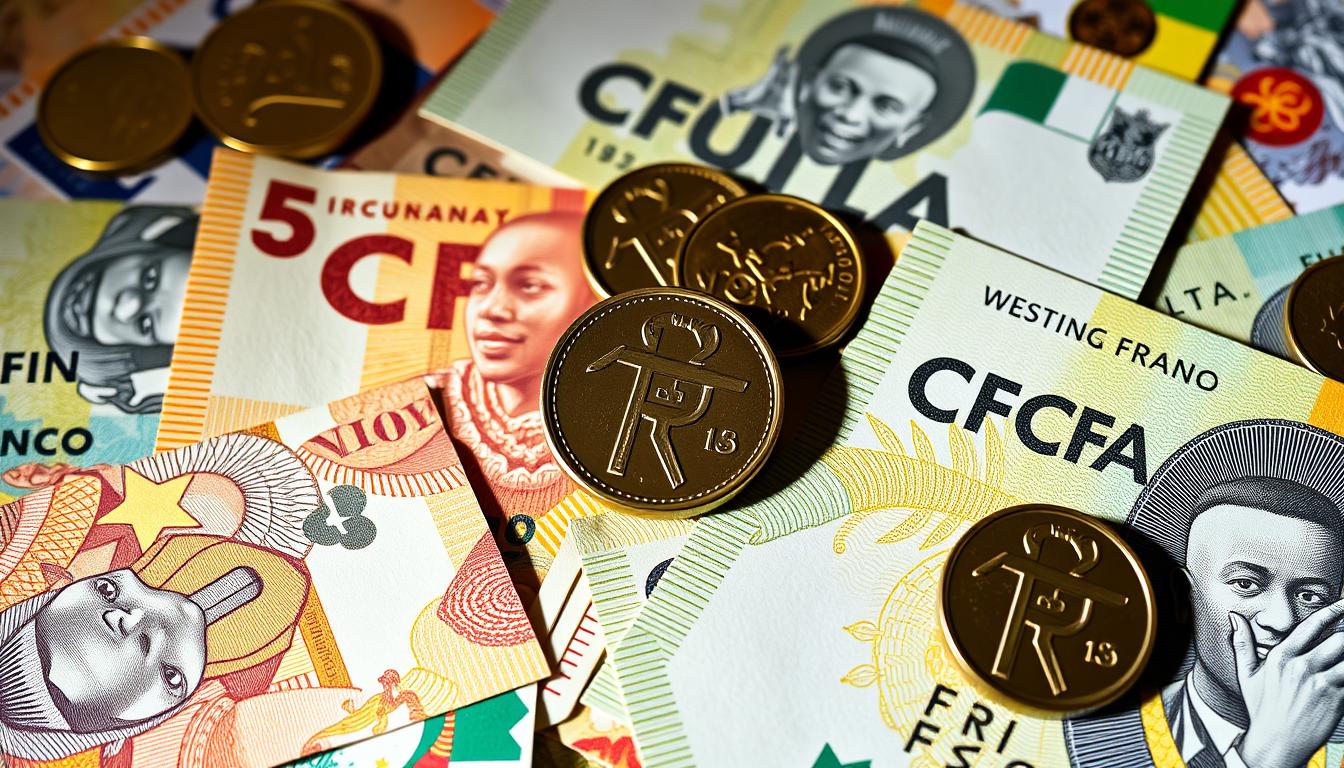
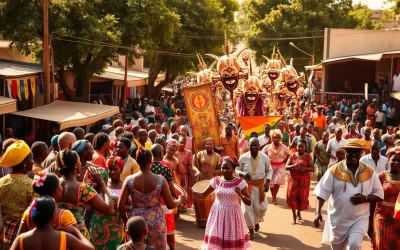


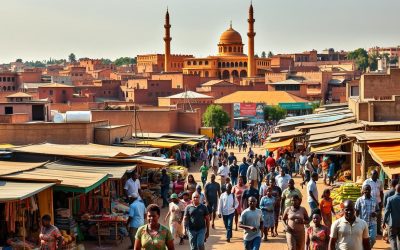

0 Comments